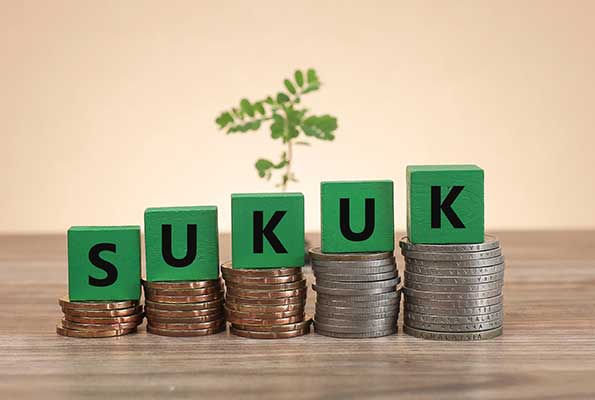Despite a recent reduction in yearly growth volumes, Islamic financial experts see sukuk as a key to global green goals.
Green Sukuks are renewable energy and environmental asset investments compliant with Shari’ah law. They address Shari’ah’s environmental concerns. Proceeds fund construction, refinancing construction debt, or government-granted green subsidies. They may entail securitizing future income cash flows from ring-fenced projects or assets with criteria.
Green Sukuk has various opportunities in Gulf countries’ solar energy programs, which have great potential for renewable energy for sustainable development and high investment needs to combat climate change.
Climate Bond Standards-certified Green Sukuk investments include many eco-friendly investments. Solar parks, biogas facilities, and wind farms are examples. Green Sukuk can also help with energy efficiency, renewable transmission and infrastructure, electric vehicles, and light rail projects. It can fund government green grants and subsidies. This variety of choices shows Green Sukuk’s adaptability in sponsoring green projects.
First Abu Dhabi Bank’s USD 500 million five-year sukuk made news. It was 2023’s first global sukuk issuance due to investor enthusiasm despite a global economic downturn.
Industry leaders at MEED and Mashreq’s Islamic Finance Business Leaders Forum discussed Sukuk’s rising use.
Fitch Ratings reported that while core market sukuk issuance declined 7.9% to USD 244.3 billion in 2022 compared to 2021, investor demand, issuer refinancing needs, and government support remain favourable.
Due to more sustainable sukuk issuances, the market is changing. In 2021, Indonesia and the GCC led ESG sukuk issuances at USD 6.1 billion, according to Refinitiv.
ESG sukuk has progressively grown from 0.4% of global sukuk volumes to 4.3% in the first half of 2022.
The GCC has seen sustained growth in ESG-linked sukuk issuances and structural frameworks. Dubai-based real estate developer Majid al-Futtaim (MAF) released the region’s first corporate green sukuk in May 2019 and a second in October 2019.
Saudi Arabia’s Riyad Bank concluded a USD 750 million green Islamic bond in February 2022, while its Islamic Development Bank raised USD 2.5 billion with its green sukuk in March 2021. Bahrain-based infrastructure fund Infracorp issued a USD 900 million London Stock Exchange green sukuk a month later.
In November 2022, Dubai Islamic Bank (DIB) priced its first sustainable sukuk, a USD 750 million, five-year offering.
Recently, a sukuk auction by Dubai-based DP World raised USD 1.5 billion for green initiatives.
Local, regional, and worldwide investors bought the green sukuk, listed on Nasdaq Dubai and the London Stock Exchange, 2.3 times oversubscribed.
The Sukuk had a 5.5% coupon and spread 119.8 bps above US treasuries.
“Through this issue, we can further connect our sustainability strategy and decarbonization activities with the group’s financial plan,” said DP World Group Deputy CEO and CFO Yuvraj Narayan.
Sustainable assets are in DP World’s portfolio. The business pledged carbon neutrality by 2040 and net zero emissions by 2050.
Green Opportunity
Long-standing sukuk are Islamic finance capital market vehicles that offer returns like bonds but are Shariah-compliant.
Sukuk issuers sell certificates to investors and buy assets with the proceeds. Since Shariah law forbids interest, investors gain partial ownership and earnings.
According to S&P Global Ratings, sukuk issuance in the first half of 2022 totalled USD 74.5 billion, making it the second-largest Islamic financial sector contributor behind banking.
“You’ll be surprised to note that institutional investors from the West and Far East, given their interest in fixed income, typically invest in sukuk,” said Sohail Zubairi, AAOIFI-certified shariah advisor and auditor and IICRA-accredited Islamic finance arbitration expert.
“They’re certain this is the right investment,” he added.
Islamic finance and its tools are ideal for socially and environmentally responsible investing due to their ethical nature. Sukuks are constructed to avoid leverage and speculation and cannot finance illegal operations.
Green or sustainability sukuk is becoming more important as firms prioritize ESG. The UKIFC believes that green and sustainability sukuk may raise USD 30 billion to USD 50 billion for SDGs by 2025.
Governments in the GCC are spending extensively on renewable energy and cars, while businesses are implementing ESG concepts into their operations and financial models. This offers green investors a huge opportunity.
“Misconception: green financing is unattractive because it has low returns. This is incorrect. Green bonds are performing well—the worldwide market has crossed USD 2 trillion. Lack of green sukuk measurement standards is the main issue,” Zubairi said.
Zubairi stressed the necessity of producing conditions equivalent to conventional green bonds using Climate Bonds Initiative standards.
The ESG maturity model also requires a rating mechanism to assess sukuk issuance performance and proceeds use. Zubairi said this will reassure investors that their money is being well managed.
“In my opinion, green sukuk should not be limited to major government-related companies, sovereigns, or private institutions,” said UAE-based senior corporate and structured finance and banking leader and Islamic finance specialist Jawaad Chawla.
We must develop the capital market at the mid-corporate level and maybe trickle it down to SMEs (Small and Medium Enterprises).
Chawla noted that 80–85% of UAE bank customers are SMEs, but just 15% of banking balance sheets are, creating “tremendous opportunity on the capital market front”.
Creating a mid-corporate sukuk market will boost the local capital market. By connecting these companies to high-net-worth individuals and institutions, it will increase their financing availability.
If produced in a green manner, these sukuks might benefit corporations and the environment by deploying funds for sustainable causes. It will boost synergy and harmony.



